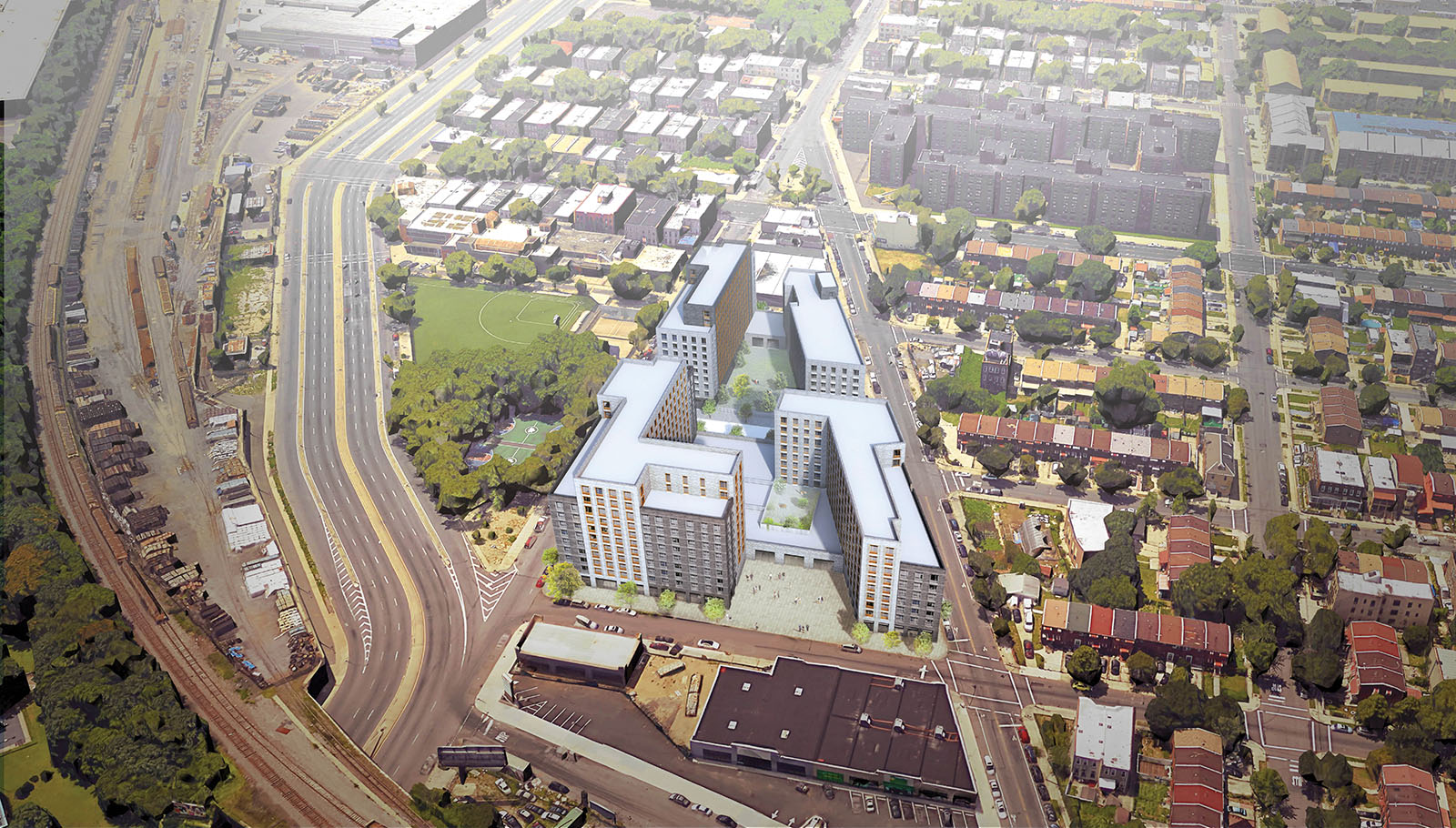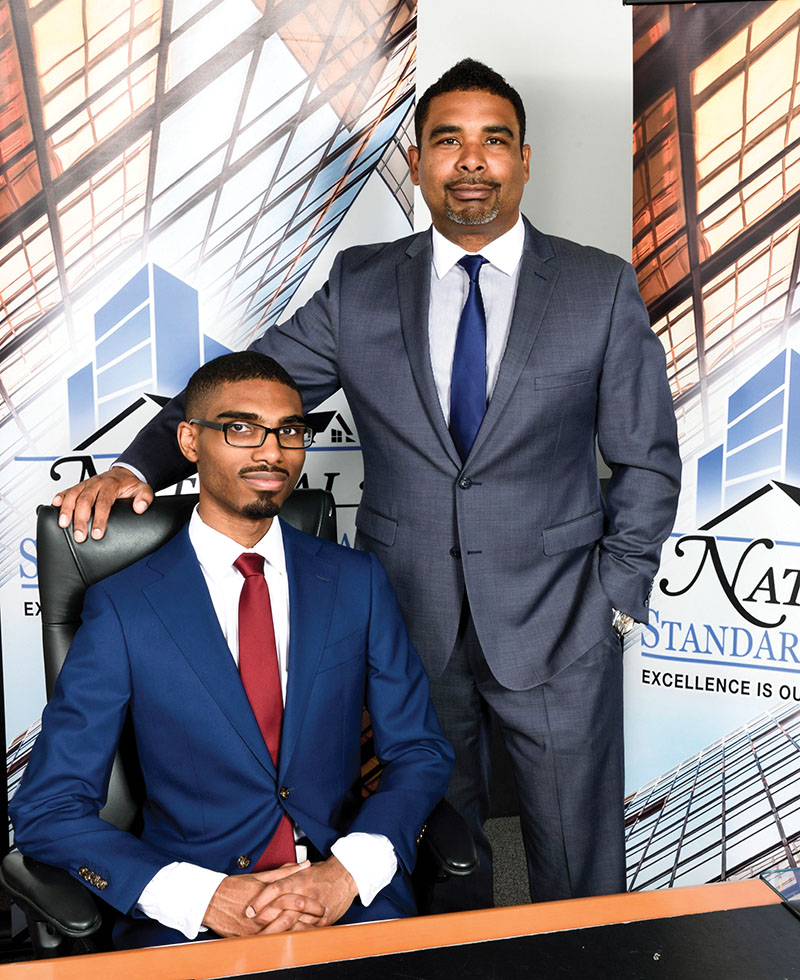Company of the Month: Osei Rubie and Nadir Rubie of National Standard Abstract continue to excel in faith-based and affordable housing developments

Floral Park, NY As summer kicks into high gear, faith-based, affordable-housing development activity is heating up.

National Standard Abstract (NSA) title insurance closed two such deals in May and June totaling $190 million and has $389 million more in the transaction pipeline. In May, NSA closed on a $36 million deal in Brownsville, Brooklyn and in June on the $154 million Ebenezer Plaza also in Brownsville.
In June, NSA closed a total of $432 million in faith-based and affordable-housing development transactions. The non-faith-based deals include the $189 million Archer Green in Jamaica, Queens; the $47 million Regina Pacis Housing in Gravesend, Brooklyn; and a $42 million project in Harlem.
Brisa Builders teamed up with the Church of God of East Flatbush to develop 531 units of affordable rental apartments in Brownsville for a project called Ebenezer Plaza. Brisa Builders regularly partners with religious organizations on development projects. Ericka Keller, chair and CEO of Brisa Builders, sees continued opportunities for religious organizations to develop affordable housing through private Uniform Land Use Review Procedure (ULURP) applications or Board of Standard and Appeals’ (BSA) variances that will allow for the development of affordable housing like Ebenezer Plaza.
In some cases, land owned by churches that was previously not feasible to develop, would now be feasible for development through the private ULURP or BSA application process—particularly for populations identified in Mandatory Inclusionary Housing. Keller said, “It is sometimes difficult to develop land owned by churches because it may be zoned M1-1, which allows for a house of worship but not residential housing. Also sometimes the way in which the church is located on a tax lot, although there may be additional floor area ratio, a variance may be needed to make building a residential edifice feasible. Although these applications take time, it may be worth the wait when it is the difference between developing a project and not being able to develop a project.”
NSA has worked on a variety of development transactions but has created a niche for faith-based development. The participation of faith-based organizations (FBO), those with affiliations to religious groups or supported by religious groups, brings a different dynamic to affordable housing development. These transactions raise unique considerations for the parties and sometimes present challenges that require creative solutions.
Churches, coalitions of congregations, and entities within larger parent organizations can be the FBO in a faith-based transaction, often in partnership with a developer. Navigating the variety of systems within these groups require advanced knowledge of the framework of the religious order in general and the specific faith-based group in particular down to the faith leader and its governing body on the local and national levels, if applicable.
It’s imperative that both the FBO and the developer determine upfront the consent process for any development transaction, and that the FBO follow their by-laws governing real estate transactions to the letter. Often times the entire congregation is a part of the decision making process. The members’ ideas or requests can have a major impact on the transaction. That impact often translates directly to structure and makeup of the project. The desires of the overall organization also must be considered. For example, that desire may be for the development project to align with the organization’s mission. A challenge faced by faith-based development is the ability to achieve mission-oriented focus that also benefits the organization financially. A successful development project must endeavor to create value that achieves both financial and mission oriented goals.
In addition to their internal processes, as charitable non-profit organizations, FBOs are required to submit any potential sale or lease of assets to the state attorney general’s office for review and approval. A challenge can also arise in this process. Both the FBO and the developer may be very proud of the proposed project, and believe that it satisfies fair and equitable consideration for the church and advances the organization’s mission but the attorney general may feel otherwise, therefore requiring changes that may not align with the initial goals and objectives of the FBO and/or developer, however approval of the proposed project must be obtained by the attorney general in order to move forward therefore changes or clarifications would have to be made as indicated by the attorney general.
It’s imperative that early in the process FBO along with development partners commission title reports on the property to understand the history of the property, often times records regarding properties may not be transferred from one leader to the next over the years and pertinent information impactful to the development proposal may not be known. It is important to have this information early in the process.
In many of the faith-based development transactions community facility along with residential housing is being proposed in a mixed used structure. The FBO usually partners with a developer and the revenue for the sale of the land may be used to build a new church building along with the affordable housing or perhaps improve the church facility through renovation if it is not being rebuilt. In another structure, revenue for the FBO may be made into a long-term income source by structuring the deal as a ground lease rather than an outright sale, allowing the FBO to retain ownership of the property while the developer improves on the land as a tenant.
For example, one faith-based organization was selling the property outright to a developer. After discussing the options, the faith-based organization decided that the best option was a land lease. As a result, the faith-based group achieved a long term income stream that it would not have gotten access to in a sale.
Although there are unique considerations to faith-based development, there is an intrinsic benefit to working with FBOs in that often times FBOs are intimately tied to the community and are typically concerned with maintaining the stability of the communities that they serve, which usually garners a level of support for a proposed project that developers alone normally do not experience. As we can see based upon the number of increased faith-based transactions, taking the extra time to consider the unique needs of the FBO and patiently navigating through the processes can only lead to positive outcomes for the community in which there is an increase in the stock of housing available within the community offered by an organization that is already a member of the community.
Developers, can realize significant tax benefits and gain access to both desirable development sites and more funding sources by partnering with faith-based organizations. Since FBOs often provide social services in neglected communities, their development projects may be eligible to receive philanthropic or government sponsored grants to help facilitate their mission. The community truly benefits from the creation of mission -based development when there is strategic and thoughtful partnerships with developers and faith-based organizations.
Over half of Long Island towns vote to exceed the tax cap - Here’s how owners can respond - by Brad and Sean Cronin


The strategy of co-op busting in commercial real estate - by Robert Khodadadian

How much power does the NYC mayor really have over real estate policy? - by Ron Cohen

Properly serving a lien law Section 59 Demand - by Bret McCabe







.png)


.jpg)
.gif)